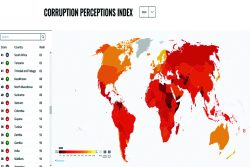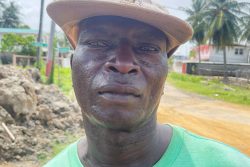Oil wealth often threatens democracies in many ways including free and fair elections, with incumbents lasting longer and autocratic leaders becoming more powerful as they consolidate their authority and keep civil society subservient.
This was one of the contentions of University of California Political Scientist, Professor Michael Ross who also warned that large oil companies like ExxonMobil “are not your friends”.
Delivering a virtual presentation last Tuesday on “The Resource Curse and Democracy: Lessons for Guyana,” the University of California Los Angeles (UCLA) professor said that new oil producing economies like Guyana have to be wary of oil giants.
Ross’ presentation was a collaborative effort with the University of Guyana’s Growth in a Resource-abundant Economy and Environment (GREEN) Institute which invited him to deliver the address via a Zoom webinar.
Ross began his presentation by stating that it has been a lifelong pursuit of his to try to better understand the very special and what he called “sometimes backward seeming politics” and development trajectories of resource-rich countries.
Ross said that most of his work has either been global in scope or focused on a particular region—the Middle East, Sub-Saharan Africa, Latin America and South East Asia. He said that most of his research is econometric—analyzing data using the best available statistical tools.
Ross said he wanted to declare that aside from reading a few articles, he was innocent of all knowledge of Guyana. Against this background he said that he could not craft very-well targeted advice or ideas, but assured that he would give the benefit of what he had studied from other places.
Referencing his book the Oil Curse (2012), Ross said it provides the big picture of how oil wealth shapes the trajectory of low and middle income countries when there is a discovery and how often expectations let violence, lack of democracy, authoritarianism and corruption prevail, sometimes making these countries seem worse off than they were before.
Focusing on the political dimensions of the curse which he said challenges governance and politics, Ross pointed out that there are three lessons which might be applicable to Guyana.
The first lesson to be aware of he said, is that when a country has an oil boom, it is the government that wins. On this point he said that the first reaction to hearing of a discovery in places where incomes are in the middle and low brackets is that the economy would boom.
It certainly does he said, but noted that that is very unspecific since there is no such thing as one single unified economy that affects everybody individually and all institutions the same.
Rather, he said there are going to be winners and losers, with the biggest winners being the government since oil discoveries lead to booms in government revenues and spending and political power.
He said that this has some important consequences. One way to see this he said is by comparing how much of the economy is accounted for in oil-exporting countries by government spending—how big is the government as a fraction of the overall economy.
Illustrating this point he said that in oil-producing countries like Algeria, Nigeria, Iran, Venezuela and Azerbaijan which border countries which do not produce oil but have similar incomes, government spending is sometimes two to three times larger in the oil-exporting countries than non-oil producing countries.
This he said underlines just how significant the government is in these countries.
Off the books
According to Ross, a lot of government spending is often “off the books,” “hidden in” national oil companies which he said comes through “back channels” or funds which are “nominally off the books” and hence do not enter these totals.
He said that it is actually difficult to know the true extent of the government’s domination of the economy but said that at the minimum it is quite significant not only in terms of money but that political influence flows into the hands of governments.
He said in some ways this is good as most countries can benefit from more spending on public goods noting that there is always the need for better infrastructure and better education. Guyana’s good fortune, he said, would be to have the revenues from the oil boom go directly to the government which has the capacity and special responsibility to provide these public goods. He said there is therefore a beneficial dimension to this first dynamic but pointed out that there exists a dangerous one as well.
Ross detailed that in countries with the most robust democracies—with vibrant contesting political parties which are actively participating in elections, where incumbents are sometimes losing elections, where power is sometimes shared, where many voices are heard, where there is a free press with different voices, a civil society representing many interests and so on; all these things are undergirded by a relatively diverse economy and relatively large private sector.
He said that as the government share of the economy grows, the remaining fraction comprising the private sector tends to be increasingly dependent on government contracts which he said ultimately has the effect of narrowing the opportunities for free expression and open contestation among competing interests.
He said that while the opportunity is there for many good things to happen, there is also the chance that civil society spaces would be increasingly diminished.
Ross said some may question why then not do the obvious and diversify as is generally the plan in most oil-producing countries. He said that this is actually very rare though he said the International Monetary Fund, the World Bank and policy-makers advise diversification.
He said that the countries which did diversify are the ones which were forced to because their oil sectors collapsed or were constrained by trade sanctions. Other countries he said with booming sectors were not able to diversify.
If diversification cannot be achieved, Ross said that there are other options such as direct cash transfers to citizens (conditional or unconditional) and strict fiscal rules about how the resources should be spent for a government with an abundance of resources.
He said, too, that controlled growth in government spending has to also be considered regarding what a sustainable rate of growth is in government spending. On this point Ross explained that most large organisations can only grow at a certain pace annually before they become grossly inefficient or even corrupt.
Squandered
He questioned how quickly can government revenue increase before the money is squandered? He said it may be a case where a government can build five new hospitals in a year, but asked what if you now have money to build 10 or 15 new hospitals?
He said it must be examined whether the government has the capacity to oversee this process or see that it is done correctly, or whether the additional money would be lost to inefficiencies and corruption.
He cautioned that exponential growth like that which Guyana is on the cusp of achieving, comes with serious challenges around this issue which he likened to building a ship while it is sailing. In fact he said it is actually worse than that.
He said it might be perceived as a problem every such country has but actually as the new fuel comes in, the ship will be sailing faster and the demand to build and build a larger ship will grow.
Addressing the second point of his presentation, Ross said it is not simply that the government wins but that whoever controls the government wins. Here he said the message is a bit darker, though not always.
He said that when looking at leaders of oil-exporting countries; dictators, autocrats and sometimes leaders who are particularly aggressive or flamboyant or particularly destructive come to mind.
He said leaders of oil exporting countries tend to leave office “feet first,” after they die, since they rarely give up power and are among the longest serving rulers in the world.
Oil wealth, he said, leads to incumbents lasting longer with autocratic leaders becoming more powerful, consolidating their authority and keeping civil society subservient.
He said that in democracies with an oil boom such as Guyana, in many cases it leads to the deterioration of that democracy, especially if there is a leader who is bent on pushing beyond the boundaries of the rule of law and normal checks and balances.
He noted the case of Venezuela which he said was among the most steadily democratic nations for some 40 years before Hugo Chavez came to power and even Russia’s Vladimir Putin.
He said that Russia, like Venezuela was largely democratic with relatively free and fair competitive elections but that all of this was taken apart by Putin as oil prices rose as did his popularity.
Ross said that in the case of Russia, it was oil money which was used to consolidate his rule, target the opposition, centralize power, and demobilize his opponents.
Ross surmised that the price of oil and the attendant economic consequence are very much on the minds of Guyanese.
He said that there is, however, the other side which is particularly dangerous when there is an incumbent in power during a long period of rising oil prices.
He said there is also a lot of money for patronage to buy off the opposition. Ross said that revenue secrecy is also critical in that governments have privileged access to just how much money is available which allows for misuse. This type of money he said has a pernicious effect on democratic institutions.
Unequal benefits
Discussing the third point of his presentation and concomitant lesson which he said Guyana can learn is that there tends to be unequal benefits from booming labour markets in oil-exporting countries.
On this point he said that anytime there is an oil boom or large increase in export revenues there will be some sectors which will boom substantially and other which will lose out. He said the latter is the sector with traded goods—farmers, manufacturers and critically, groups which he said are stuck in the losing sector.
He said that certain occupations are dominated by, or exclude others from joining. He then questioned, what happens if the sectors which are booming in the economy are ones that are closed to certain groups?
The most prominent example of this he said, is the effects of oil booms on opportunities for women in oil-rich countries, specifically pointing out the Middle East where there are very few job opportunities for them.
Because of the Dutch Disease, however, he said that that stepping stone is removed. This he said has kept women from finding access in the labour markets and reinforced patriarchal norms.
Against this backdrop the political scientist said that he is worried when he thinks about countries which are newly booming today—not necessarily he said about women as he does not know what the overall map of occupational segregation looks like, but because—if certain groups are systematically excluded from the booming sectors it can exacerbate social division.
The basic task he says that faces any country that depends on its extractive sector is how to turn wealth that is below the ground, to wealth that is above the ground which he says should not be confused with income.
Ross described it as a “stack of wealth” which he says belongs to the people of a country and exists in great abundance, but is inaccessible, providing no benefits if it is below the ground. Turning that below-ground wealth into above-ground wealth the professor said, is a very difficult process when there is such a quick turnaround in the economy with revenue considerably opening up.
Ross specifically underscored that “oil companies are not your friends.” He said that while they may like to portray themselves as friends and though persons working there may be your friends, they are in fact not.
Ross said that country after country has experienced this and has had to sometimes learn this lesson the hard way.
He said that oil companies—successful ones like ExxonMobil are remarkably sophisticated organisations. Ross said that “they don’t do it by being stupid. They don’t do it by putting other people’s interest before their own. They don’t do it by being nice, they don’t do it by developing trusting relationships with governments.”
The professor said that they do it by advancing their interests very systematically sometimes ruthlessly, sometimes constructively and other times destructively, but stressed that they are superbly skilled in advancing their own interests.
He said that anyone who interacts with them has to be equally vigilant about their own interest and recognize that their interest is not the same.
Ross listed some ways in which he said governments can enact extra safeguards for democracy when it is facing dangers.
He posited power-sharing arrangements, the need for independent judiciaries which is critical everywhere, transparency, a strong civil society and education and academic freedoms.
On power-sharing he said that it is important for excluded groups to realise that they have a stake in the system, that they are not going to lose out from the current government and therefore they have an interest in playing by the rules and keeping institutions well-functioning.
Noting the turmoil currently facing the world not only because of the COVID-19 pandemic but also the sometimes very violent protest actions plaguing the United States, Ross said he speaks quite humbly from a country where democracy and equal rights at this time feel “very fragile” and recognizes that the challenges faced by other countries are also faced by the United States.







